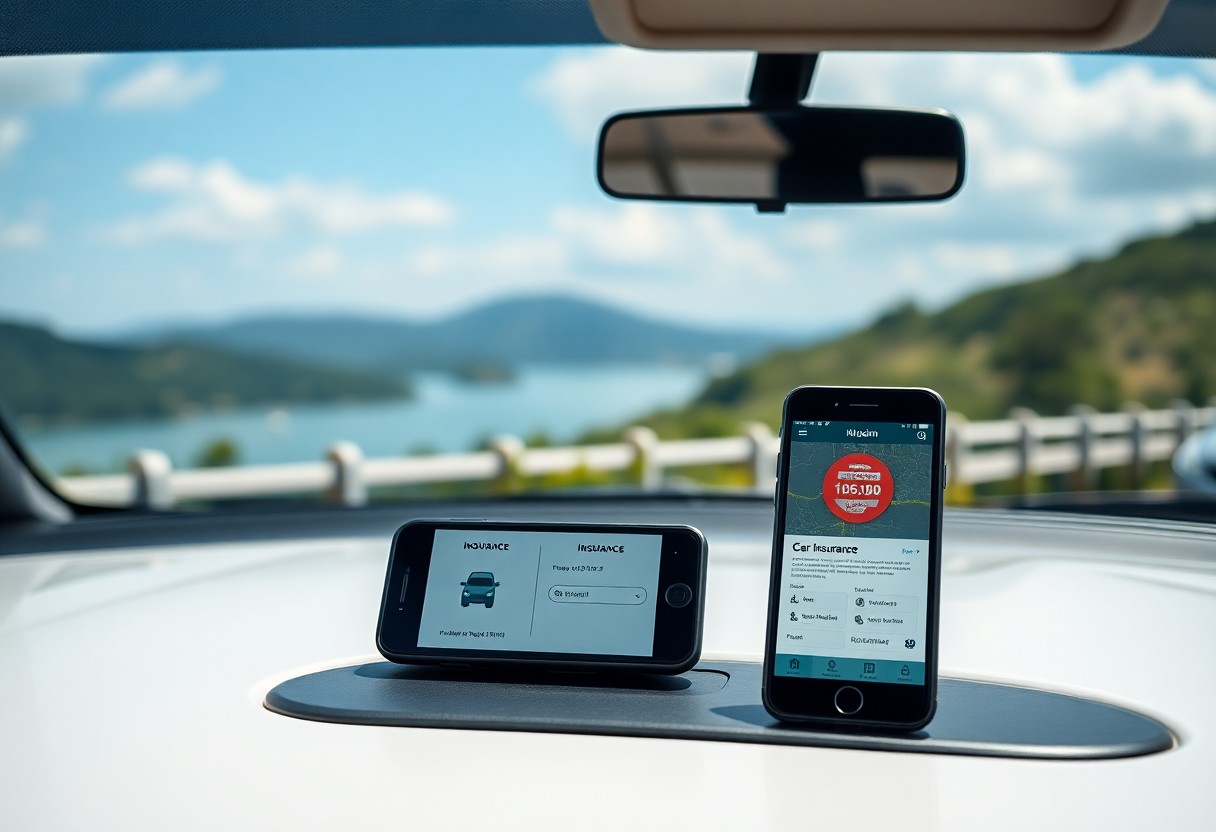Many travelers might view rental car insurance as just another expense on their travel budget, but it is actually an indispensable safeguard against serious financial setbacks that could arise unexpectedly. When you rent a vehicle, the multitude of insurance options can feel overwhelming. Nevertheless, making an informed choice is essential for protecting yourself from thousands of dollars in potential repair and liability expenses. Whether your trip is for business or pleasure, comprehending your rental car insurance choices allows you to make well-informed decisions that can lead to substantial savings and minimized anxiety later on. This detailed guide will equip you with all the fundamental information about rental car coverage, covering everything from basic liability protection to the intricacies of comprehensive insurance packages.
Mastering the Fundamentals of Rental Car Insurance for Your Next Journey
When you decide to rent a vehicle, securing car insurance is a vital safety measure against unforeseen costs that may occur during your travels. It’s crucial to familiarize yourself with the basic types of coverage available, including collision damage waiver, liability protection, and personal accident insurance. Research shows that 1 in 6 renters will face some form of incident, highlighting the importance of having adequate insurance coverage for your peace of mind and financial stability.
Grasping the Legal Obligations Surrounding Rental Car Insurance
In every U.S. state, it is a legal requirement to maintain minimum liability insurance coverage when renting a car along with your driver’s license. While your personal auto insurance may extend its benefits to rental vehicles, there can be significant gaps in coverage that leave you vulnerable to substantial financial risks. It’s vital to review your current insurance policy and understand local regulations to make an informed decision about whether to decline additional rental insurance options.
Delving into Financial Protection through Rental Car Insurance
Establishing financial protection through rental car insurance acts as a shield against potentially significant costs stemming from accidents or vehicle damages. You will need to select coverage options such as damage to the rental car (collision damage waiver), liability for harm to others, and personal injury protection. With average repair bills for rental vehicles often surpassing $3,000, acquiring the appropriate coverage is critical for your financial reassurance.
Moreover, it’s essential to account for various factors like your travel destination, the length of your trip, and your individual risk tolerance. Although your credit card may provide some level of rental car protection, these benefits usually come with restrictions. A meticulous examination of deductibles, coverage limits, and exclusions is necessary to guarantee you have comprehensive protection tailored to meet your specific needs.
Recognizing the Primary Types of Rental Car Insurance Coverage
As you navigate the car rental process, you will encounter several crucial insurance coverage options that are designed to protect both you and the vehicle you are renting. These options range from basic liability coverage to more comprehensive plans. Being well-informed about these coverage types will empower you to make educated decisions regarding your rental car protection requirements.
| Coverage Type | Protection Offered |
|---|---|
| Collision Damage Waiver | Coverage for vehicle damage and theft |
| Liability Insurance | Protection against third-party injury and property damage |
| Personal Accident Insurance | Coverage for medical expenses incurred |
| Personal Effects Coverage | Protection for personal belongings in the vehicle |
| Supplemental Coverage | Additional protection beyond standard coverage |
Comprehending Collision and Loss Coverage Options
Rental vehicle insurance typically includes comprehensive protection against damages incurred from accidents, theft, or vandalism. This coverage generally comes with a deductible, which can range from $250 to $1,000, depending on the specific plan you select. By opting for this level of insurance, your rental vehicle is protected against most forms of physical damage, allowing you to travel with confidence and peace of mind.
Assessing Your Liability Protection Choices
Liability protection represents one of the most crucial elements of rental car insurance, as it shields you from claims made by third parties for bodily injury or property damage. Typical liability coverage limits usually range from $50,000 to $1 million per incident, depending on the particulars of your chosen policy.
Without sufficient personal liability protection, you may face substantial financial exposure. Most policies include coverage for legal defense expenses as well as settlement payments that fall within your coverage limits. You can select either standard liability coverage or consider supplemental options for an extra layer of security.
Enhancing Your Protection with Secondary Insurance Options
Once you understand your primary coverage, it’s important to explore additional layers of protection that can improve your rental car experience. These secondary options can effectively bridge significant gaps in your coverage, offering up to $300,000 in added protection beyond your primary insurance. Such supplemental options are particularly advantageous when your existing coverage may not fully suffice.
Utilizing Personal Protection Plans for Extensive Coverage
To further enhance your safety net, Personal Protection Plans can deliver comprehensive coverage for medical expenses and personal belongings while using a rental vehicle. Typically ranging from $5 to $15 per day, these plans can cover up to $50,000 in medical expenses for you and your passengers. Additionally, your valuable items are insured against theft or damage while stored in the rental vehicle.
Exploring Property Protection Coverage for Your Personal Belongings
In addition to personal protection, Property Protection Coverage is designed to protect your belongings while inside the rental car. This coverage can reimburse you for up to $2,500 worth of personal items that may be stolen or damaged during your rental period.
Furthermore, Property Protection Coverage goes beyond simple theft protection. It includes incidents such as vandalism, natural disasters, and damage from accidents where you are not at fault. You will receive coverage for valuable items like electronics and luggage, typically with low deductibles ranging from to 0 per claim.

Customizing Coverage Options for Your Unique Rental Needs
Your rental car insurance needs may extend beyond basic coverage, especially if you have specific travel plans or requirements. Whether you’re planning an adventurous off-road excursion or need to transport high-value equipment, specialized coverage options can provide tailored protection to meet your unique circumstances.
Examining Various Types of Supplemental Insurance
| Coverage Type | Protection Offered |
|---|---|
| Equipment Coverage | Protection for specialized equipment and modifications |
| Off-Road Protection | Coverage for damages occurring during authorized off-road use |
| International Coverage | Protection that extends across international borders |
| Commercial Use Coverage | Protection for business-related vehicle use |
| Extended Duration Coverage | Protection tailored for long-term rentals |
Understanding Roadside Assistance Options for Added Peace of Mind
Alongside standard insurance coverage, roadside assistance can offer vital support in unexpected situations. This service generally includes 24/7 emergency support, towing services, and mechanical assistance for a variety of issues. Being aware of your roadside assistance options can prevent potentially stressful incidents and expensive recovery fees.
Roadside assistance services typically cover battery jump-starts, fuel delivery, lockout services, and tire changes. These services are especially useful when traveling in unfamiliar territories or engaging in long-distance travel. Depending on your requirements, you can choose from basic packages starting at $5 per day or opt for more comprehensive coverage that includes unlimited service calls.
Evaluating Cost Factors for Rental Car Insurance
In order to make educated choices regarding rental car insurance, it is essential to assess the daily costs in relation to potential out-of-pocket expenses that could arise in the event of an accident. Insurance rates typically vary from $10 to $30 per day for basic coverage, while comprehensive protection may reach up to $50 daily. Viewing these costs as an investment rather than a mere expense can significantly aid in making informed decisions about your insurance coverage requirements.
Recognizing Key Factors That Impact Insurance Premiums
Several important factors can affect the premium rates for rental car insurance:
- Type and value of the vehicle
- Duration of the rental
- Your driving history
- Location of the rental
- Level of coverage selected
Understanding these factors can help you anticipate and potentially reduce your insurance expenses.
Exploring Payment Structures for Rental Car Insurance
When it comes to rental car insurance, you will encounter various payment structures. Most rental companies provide daily rates for short-term rentals, while extended rentals may qualify for weekly or monthly discounts. Your choice between making an upfront payment or selecting daily billing can significantly affect the overall cost.
Cost structures can vary widely among providers, with bundled packages often presenting better value. By combining different types of coverage, you might save anywhere from 15% to 20%. Additionally, some companies offer loyalty programs that can reduce your insurance costs by as much as 25% for frequent renters.

Strategically Navigating Your Rental Car Insurance Decisions
Your decisions regarding rental car insurance should be approached with a strategic mindset. According to recent industry statistics, 65% of renters end up overpaying for coverage they may not even require. Your decision-making process should find a balance between cost-effectiveness and comprehensive protection. It’s critical to analyze your current insurance coverage from credit cards or personal auto policies before committing to additional options.
Conducting a Thorough Evaluation of Your Coverage Needs
After determining your insurance requirements, evaluate each coverage option against your specific circumstances. Your personal auto insurance may already provide primary coverage up to $100,000 for rental vehicles. It’s also wise to examine your credit card benefits, as many premium cards offer collision damage waiver (CDW) at no additional cost. This careful evaluation can help you save up to $30 per day by avoiding unnecessary coverage.
Formulating a Policy Selection Strategy That Meets Your Needs
Once you’ve identified your coverage gaps, focus on selecting policies that effectively address these specific needs. Your strategy should prioritize essential areas of coverage while avoiding redundant protection. Consider various factors such as your travel destination, rental duration, and the value of the vehicle. Statistics indicate that supplemental liability insurance is particularly valuable in urban settings, where accident rates are known to be significantly higher.
Deciding on rental car insurance necessitates careful consideration of multiple variables. Your individual risk tolerance, the nature of your travels, and your current coverage all play significant roles in this process. Industry reports suggest that an optimal combination of coverages can lead to savings of up to 60% on insurance costs while still providing adequate protection. Prioritize policies that specifically address your vulnerabilities rather than opting for generic packages.
Critical Insights for Choosing the Right Rental Car Insurance
Your selection of rental car insurance can profoundly impact your overall travel experience. By grasping the diverse coverage options available—from collision damage waivers to roadside assistance—you empower yourself to safeguard your finances and maintain peace of mind during your travels. Before you pick up your next rental vehicle, take the time to evaluate your current coverage, compare available options, and select protections that align with your specific needs. Making informed insurance decisions today can prevent significant headaches in the future, ensuring a smooth and stress-free rental experience.
The Article: The Complete Guide to Rental Car Insurance: What You Need to Know appeared first on https://rentacar24.org/
The Article Rental Car Insurance: Essential Insights You Need to Know Was Found On https://limitsofstrategy.com



You make a solid point about the importance of rental car insurance. I’ve definitely been in situations where I thought I could skip it to save a few bucks, but it’s really not worth the risk. I still remember a trip where I had a minor fender bender; the stress of dealing with the rental agency was like a whole extra vacation. I’d love to hear what others do—are most people opting for the full coverage, or do many find that their personal insurance covers them well enough? It would be interesting to see how different travel experiences shape our choices too. What do you all think?
You bring up a relatable scenario. Dealing with a fender bender can turn a fun trip into a headache. Many people think they can save money by skipping the insurance, only to realize how quickly things can escalate if something goes wrong. It’s a classic case of weighing short-term savings against potential long-term stress and costs.
You bring up a relatable scenario. Dealing with a fender bender can indeed turn a fun trip into a headache. It’s interesting to consider how many people weigh short-term savings against potential long-term stress and costs when it comes to insurance. I had a friend who opted to go without it for a while, thinking it would save him money, but he ended up with a big repair bill after a minor accident. It’s kind of a wake-up call when you realize how the costs can stack up in unexpected ways.
I completely get where you’re coming from; navigating rental car insurance can be just as tricky as dealing with that fender bender, and it’s worth being informed to avoid any future headaches.
‘Rental Car Insurance Guide: What You Need to Know’
https://deepernyc.com/rental-car-insurance-guide-what-you-need-to-know/.
You bring up some really valid points around rental car insurance. It’s easy to think of it as an unnecessary expense when you’re trying to stick to a budget, but dealing with issues post-accident can be a real headache. I had a similar experience where I opted not to take the coverage, thinking my personal insurance was good enough. When I ended up with a small dent, the stress of navigating claims and figuring out what was covered was overwhelming.
It’s interesting how that experience really puts things into perspective. Many of us think we can save a few bucks by skipping rental car insurance, but then we find out just how complicated things can get when accidents happen. Going through claims can feel like a maze, and you’re left wondering what’s really covered.
It sounds like you’ve been on quite the rollercoaster with rental car insurance. That moment when you think you’re saving a few bucks only to find yourself knee-deep in paperwork and stress over a tiny dent is enough to rival any reality TV plot twist. You think you’re not getting into any accidents, and then—bam!—you’re suddenly a claims adjuster’s best friend.
You bring up such a relatable experience with rental car insurance. It’s funny how a single minor incident can turn into a whole hassle, right? I think many of us underestimate the potential stress involved until we’re knee-deep in it.
You really hit the nail on the head with that observation. It’s wild how something that seems minor—like a scratch on a rental car—can spiral into a full-on ordeal. I think a lot of us go into these situations thinking, “What’s the worst that could happen?” But when you’re knee-deep in paperwork and phone calls, it’s easy to feel overwhelmed.
It’s so true—those seemingly small things can snowball into a major headache. I had a similar experience with a rental car, where a tiny ding turned into endless back and forth with the rental company. What struck me most was how quickly my initial anxiety about the situation escalated once I got into the nitty-gritty of it all. It really highlights how we often underestimate the administrative hurdles that can come with everyday situations.
It sounds like you’ve been through a sticky situation with the rental car process; those kinds of experiences can really add unnecessary stress to what should be a fun trip. It’s interesting how a little fender bender can turn into a full-blown saga with all the logistics and paperwork involved—it’s almost like a travel horror story, right? Most people don’t think about that stress until it hits them.
Ah, the tangled web of rental car insurance—a topic that often feels like navigating a maze blindfolded while trying to balance a piñata on your head. I remember my last rental experience; I was convinced I could just “wing it” without added coverage. Cue the universe sending me a minor heart palpitating moment when the car I rented merely tapped a curb and I thought, “Whelp, there goes a chunk of my vacation money!”
Your exploration of rental car insurance really resonates with me, especially as I’ve navigated the tricky terrain of travel preparations in the past. It’s easy to overlook this aspect of the rental process, but your points about it being a safeguard against financial pitfalls struck a chord. There’s nothing worse than getting into an accident in a new city and discovering you’re not adequately covered, which can lead to some serious financial stress.
You’ve raised an important point about rental car insurance often being seen as just another line item on a travel budget, rather than a crucial aspect of risk management. I’ve learned from past experiences that understanding the nuances of insurance options can indeed save travelers from potential financial distress.
It’s great to hear you found the discussion about rental car insurance valuable! It’s so easy to overlook these options until something goes wrong. You touched on a key point: many travelers view rental car insurance as just another line item on the budget, but understanding what’s at stake can really change that perspective.
You’ve touched on a key aspect that many travelers overlook when planning their trips. Rental car insurance can feel like just another item on the budget checklist, but its real value comes into focus when we think about the risks involved in driving a vehicle that isn’t our own. Many travelers may trust their own driving skills, but the unfamiliarity with both the vehicle and the local roads can lead to unexpected issues.